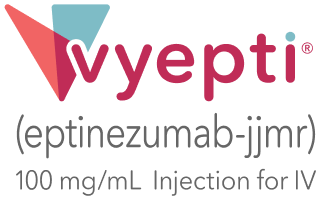VYEPTI is an anti-CGRP mAb administered as an IV infusion every 3 months1*
IV administration of VYEPTI was chosen based on results from phase 1 research for determining the safety, tolerability, and pharmacokinetics (PK) for eptinezumab 100 mg administered intravenously vs subcutaneously over 12 weeks. At the point of administration, IV eptinezumab resulted in higher levels of eptinezumab in serum compared with subcutaneous eptinezumab.2
PK parameters for IV vs SubQ eptinezumab 100 mg following 1 dose1-3*
IV eptinezumab 100 mg (n=13)SubQ eptinezumab 100 mg (n=12)
IV eptinezumab reached a mean maximum concentration (Cmax) of 36.0 (6.7) µg/mL (SD) compared to a Cmax of 11.0 (3.2) for eptinezumab administered subcutaneously.
*Phase 1 study results. PK study 2 results shown here.
CGRP, calcitonin gene-related peptide; mAb, monoclonal antibody; SD, standard deviation; SubQ, subcutaneous; Tmax, time to maximum concentration.
See the science behind VYEPTI
See the science behind VYEPTI
Selective binding6,7
With no known off-target activity, VYEPTI is high selective, binding to both the ⍺- and β-forms of the CGRP ligand
Sustained duration of action1,8,9
VYEPTI has a high affinity for the CGRP ligand and has a terminal half-life of 27 days





